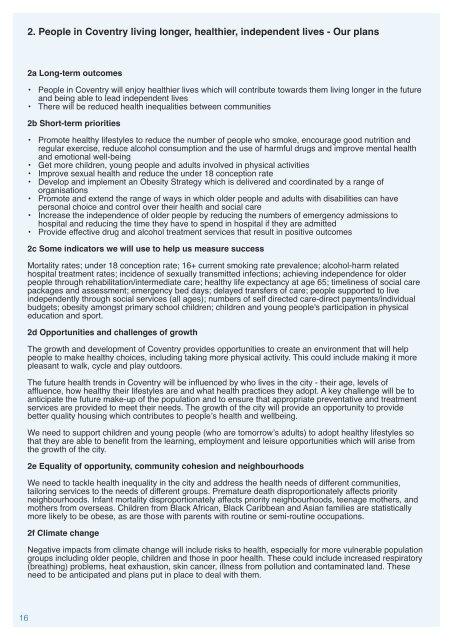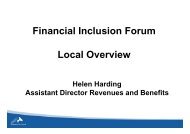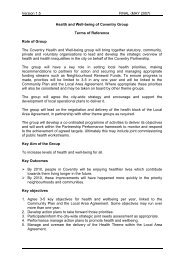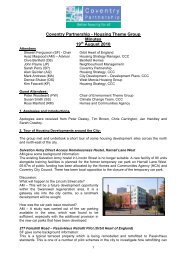Sustainable Community Strategy - Coventry Partnership
Sustainable Community Strategy - Coventry Partnership
Sustainable Community Strategy - Coventry Partnership
You also want an ePaper? Increase the reach of your titles
YUMPU automatically turns print PDFs into web optimized ePapers that Google loves.
2. People in <strong>Coventry</strong> living longer, healthier, independent lives - Our plans<br />
2a Long-term outcomes<br />
• People in <strong>Coventry</strong> will enjoy healthier lives which will contribute towards them living longer in the future<br />
and being able to lead independent lives<br />
• There will be reduced health inequalities between communities<br />
2b Short-term priorities<br />
• Promote healthy lifestyles to reduce the number of people who smoke, encourage good nutrition and<br />
regular exercise, reduce alcohol consumption and the use of harmful drugs and improve mental health<br />
and emotional well-being<br />
• Get more children, young people and adults involved in physical activities<br />
• Improve sexual health and reduce the under 18 conception rate<br />
• Develop and implement an Obesity <strong>Strategy</strong> which is delivered and coordinated by a range of<br />
organisations<br />
• Promote and extend the range of ways in which older people and adults with disabilities can have<br />
personal choice and control over their health and social care<br />
• Increase the independence of older people by reducing the numbers of emergency admissions to<br />
hospital and reducing the time they have to spend in hospital if they are admitted<br />
• Provide effective drug and alcohol treatment services that result in positive outcomes<br />
2c Some indicators we will use to help us measure success<br />
Mortality rates; under 18 conception rate; 16+ current smoking rate prevalence; alcohol-harm related<br />
hospital treatment rates; incidence of sexually transmitted infections; achieving independence for older<br />
people through rehabilitation/intermediate care; healthy life expectancy at age 65; timeliness of social care<br />
packages and assessment; emergency bed days; delayed transfers of care; people supported to live<br />
independently through social services (all ages); numbers of self directed care-direct payments/individual<br />
budgets; obesity amongst primary school children; children and young people's participation in physical<br />
education and sport.<br />
2d Opportunities and challenges of growth<br />
The growth and development of <strong>Coventry</strong> provides opportunities to create an environment that will help<br />
people to make healthy choices, including taking more physical activity. This could include making it more<br />
pleasant to walk, cycle and play outdoors.<br />
The future health trends in <strong>Coventry</strong> will be influenced by who lives in the city - their age, levels of<br />
affluence, how healthy their lifestyles are and what health practices they adopt. A key challenge will be to<br />
anticipate the future make-up of the population and to ensure that appropriate preventative and treatment<br />
services are provided to meet their needs. The growth of the city will provide an opportunity to provide<br />
better quality housing which contributes to peopleʼs health and wellbeing.<br />
We need to support children and young people (who are tomorrowʼs adults) to adopt healthy lifestyles so<br />
that they are able to benefit from the learning, employment and leisure opportunities which will arise from<br />
the growth of the city.<br />
2e Equality of opportunity, community cohesion and neighbourhoods<br />
We need to tackle health inequality in the city and address the health needs of different communities,<br />
tailoring services to the needs of different groups. Premature death disproportionately affects priority<br />
neighbourhoods. Infant mortality disproportionately affects priority neighbourhoods, teenage mothers, and<br />
mothers from overseas. Children from Black African, Black Caribbean and Asian families are statistically<br />
more likely to be obese, as are those with parents with routine or semi-routine occupations.<br />
2f Climate change<br />
Negative impacts from climate change will include risks to health, especially for more vulnerable population<br />
groups including older people, children and those in poor health. These could include increased respiratory<br />
(breathing) problems, heat exhaustion, skin cancer, illness from pollution and contaminated land. These<br />
need to be anticipated and plans put in place to deal with them.<br />
16
















